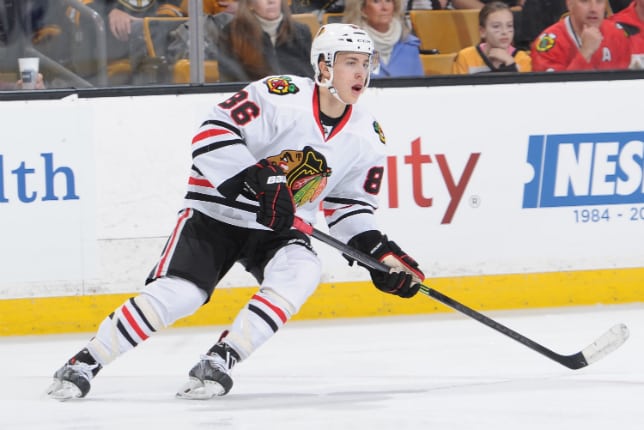
Teravainen’s growth giving way to more opportunities with Blackhawks
Teuvo Teravainen didn’t start the season in Chicago, but he’s made the most of his opportunities and is proving he belongs in the big league. Against Anaheim, he’s had moments of brilliance and that means good things for the Blackhawks, regardless of the outcome of the Western Conference final.
 Teravainen’s growth giving way to more opportunities with Blackhawks
Teravainen’s growth giving way to more opportunities with BlackhawksThe storyline following Game 4 of the Western Conference final was an obvious one: after being scratched for Game 3, Antoine Vermette had come back into the Chicago Blackhawks lineup and managed to score the game-winning goal in the second overtime. But down the score sheet and first into the celebratory pile was Teuvo Teravainen, he himself a scratch in Game 3, who started the play that resulted in the overtime winner.
To say Teravainen’s campaign has been an easy one, free from any tribulations, would be far from the truth. He was bounced between the NHL and AHL twice, he wasn’t called up until January, he scored just four goals on 66 shots in 34 big league games and managed only nine points in what many hoped could have been an outstanding rookie season.
When he did play, he was used sparingly, only logging an average of 12:47 over his 34 contests. And in the post-season, it’s been much of the same. Play two games, sit out a few, get another shot and then watch from the sidelines. But in Game 4, as he was in Games 1 and 2, Teravainen has finally looked as if he might be on to something.
With all the concerns about the Blackhawks going forward – both in the immediate and in the cap-crunch future – it looks like in Teravainen, the Blackhawks have landed another promising young talent and it couldn’t have come at a better time.
In the immediate, what one has to understand about the Blackhawks is the mindset of Joel Quenneville. Short of being Patrick Kane, Quenneville demands near excellence from his players on both sides of the puck. Few coaches appear as hard to win over and gain the trust of as Quenneville does. Case in point, Chicago’s current issue with defensive depth isn’t for lack of actual defensemen, but rather defensemen Quenneville is willing to trust. That’s why Kimmo Timonen – he a veteran of more than 15 seasons – is averaging less than 10 minutes per game.
That makes the scratching of Teravainen, something that has happened for five of the Blackhawks’ 14 games so far, more understandable – there was something Quenneville wasn’t pleased about. But reading into ice time also helps illustrate that Quenneville is beginning to trust the 20-year-old winger more and more.
Prior to Game 4, Teravainen had skated more than 13 minutes only twice in the post-season – the playoff opener against Nashville in which he skated 15:36 of a double-overtime contest and Game 2 against Anaheim when Teravainen played 22:17 in a game that nearly went to four extra frames.
In Game 4 against the Ducks, however, Teravainen played more than 18 minutes in a double-overtime game. He was on the ice for the game-winner and it was his second shift early on in the frame. In the first overtime period, he played more than Bryan Bickell, Vermette and Patrick Sharp, while skating a mere five seconds less than Marian Hossa.
Assisting on the game-winner is an easy measure of his impact, but that Quenneville played him so much in overtime of a game that could have decided Chicago’s playoff fate is a ringing endorsement. His defensive responsibility helps but so, too, does the fact that he’s been one of Chicago’s most creative offensive players.
The obvious moment of brilliance was Teravainen’s neutral-zone pass to Patrick Sharp that nearly resulted in the overtime winner, but what sticks out is how he was able to utilize a soft chip into the Anaheim zone to put pressure on the defense when a hard dump-in to the Ducks’ zone was proving fruitless. None of those resulted in goals, but they offered a threat when Chicago had achieved few to that point. Quenneville even let Teravainen off the hook when his youthful exuberance and over-thinking resulted in a turnover just inside the Anaheim blueline.
With Kane and Jonathan Toews battling to find space and Hossa and Sharp having difficulty finding the back of the net, depth scoring can help Chicago win right now and Tervainen could be a major factor at any moment in this series. But next season, his play will matter just as much.
The 2015-16 salary cap projects to be $71 million and Chicago already has roughly $63.5 million tied up in salary for next season. They have only four NHL defensemen with contracts for next year and Brandon Saad and Marcus Kruger are in line for new deals. With the cap situation so tight, no team will need cheap reinforcements as bad as the Blackhawks and Teravainen is the head of that class.
His performance in this post-season is proving that he has the ability to be an NHL regular already and Quenneville’s growing confidence in Teravainen is a major positive for Chicago. If Teravainen’s growth continues on its current trajectory, the future will continue to be bright for both he and the Blackhawks.